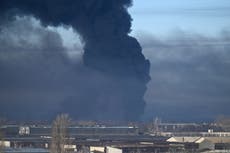Ukraine: Central Europe braces for millions of refugees after Russia invasion
Poland is setting up reception points on the border while nations including Finland and Germany vow to help
Central Europe is bracing for the arrival of millions of Ukrainians following the Russian invasion, with Poland setting up reception points on the border and the continent’s leaders pledging help.
Poland is ready for almost a million people to arrive in the country, and began to set up eight reception points for refugees along its border with Ukraine on Thursday morning after Russia launched an all-out invasion of its neigbhour by land, air and sea.
Political leaders from Finland, Germany, Moldova and Slovakia also pledged their support for refugees. The Czech foreign minister condemned Vladimir Putin’s actions as a “barbaric act of aggression” and Poland called for the “fiercest possible sanctions” against Russia.
Their comments come after the US warned that up to five million people could be displaced as a result of the invasion and trigger one of the world’s largest refugee crises.
Major roads out of Ukraine’s capital Kiev were blocked up on Thursday morning as thousands of people tried to flee the city.
“In the next few hours, reception points for refugees from Ukraine will be created,” the PAP news agency quoted Polish deputy minister of Internal Affairs, Pawel Szefernaker as saying.
He said that eight points will be created initially to provide medical assistance, food and information.
Ukrainians started trickling into Poland through the Medyka crossing on Thursday morning, with some carrying luggage and accompanied by children. Alexander Bazhanov, 34, fled his home in Mariupol in eastern Ukraine with his wife and young child, taking only what they could carry.
He said: “I don’t have any feelings other than I am very scared. I will visit my father in Spain but I don’t have any money and I don’t know how I will do that.”
Finland’s prime minister Sanna Marin said her country was prepared to receive refugees at a press conference. Ms Marin estimated there could be a large number of people trying to escape towards the European Union, where Ukrainians can travel visa-free.
“[Finland’s] ministry of interior for its part is preparing to receive refugees from Ukraine,” she told reporters.
Moldova’s president Maia Sandy said that her country, which shares a border with Ukraine, would introduce a state of emergency and was ready to accept tens of thousands of people.
“We will help people who need our help and support,” she said.
Moldova’s interior minister, Ana Revenco, said on Thursday that 1,900 Ukrainian citizens had crossed into Moldova so far, according to Radio Free Europe.
Hungary said that it will send a number of troops to the border with Ukraine for security and humanitarian reasons. Their defence minister, Tibor Benko, said on Wednesday that the country would prepare for tens of thousands of refugees if necessary.
Slovakia will also send up to 1,500 troops to the border to help refugees as they prepare for increased crossings.
Germany will offer support to countries in eastern Europe, especially Poland, “in the event of large refugee movements”, interior minister Nancy Faeser said.
Poland has already made significant preparations for an influx of Ukrainians and local officials have drawn up lists of accommodation, which could be used if thousands flood over the border.
Following the Russian invasion, Polish prime minister Morawiecki called on “Europe and the free world” to “stop Putin”.
“We must immediately respond to Russia’s criminal agression on Ukraine,” he said. “Today’s European Council should approve fiercest possible sanctions.”
The US ambassador to the United Nations, Linda Thomas-Greenfield, told a security council meeting late on Wednesday that the Russian invasion could displace up to five million people.
She said that a war could cause famine in other countries which depend on Russian and Ukrainian wheat exports.
“Russia’s actions could cause a spike in food prices and lead to even more desperate hunger in places like Libya, Yemen and Lebanon.
“The tidal waves of suffering this war will cause are unthinkable”.
Join our commenting forum
Join thought-provoking conversations, follow other Independent readers and see their replies
Comments


Bookmark popover
Removed from bookmarks